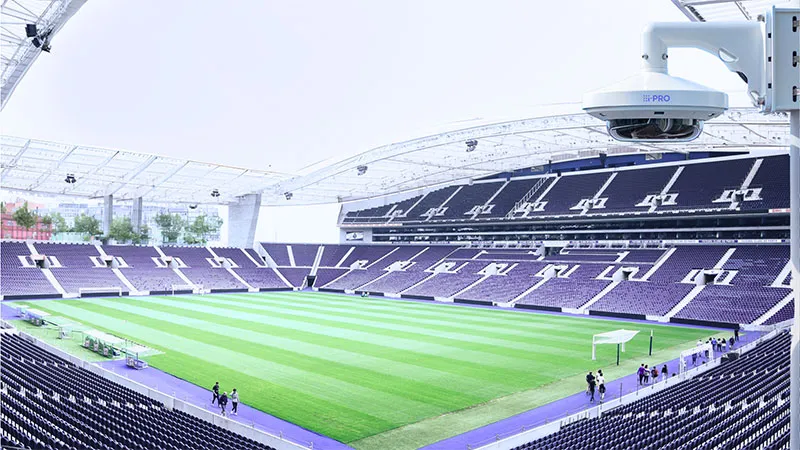
As preparations for one of the world’s largest sporting events get underway this summer, the use of AI technology to bolster security has drawn international attention and scrutiny. This has sparked extensive discussions about the implications of AI-based security cameras on privacy and data protection.
Privacy and data protection
Privacy is always a valid concern whether cameras are AI-based or not. The widespread use of any surveillance technology can raise legitimate questions about surveillance, data security, data collection, and lack of transparency and consent. Striking a balance between the technology’s benefits and privacy rights requires products with built-in privacy features as well as strong regulations, transparency, consent mechanisms, and stringent security protocols. Through careful application and effective oversight, AI can increase security and help improve operations to enhance the attendee experience without significantly impacting anyone’s privacy.
Benefits of AI
Because of the sheer number of people at such an event, security teams welcome the help AI-enabled video cameras can provide in keeping spectators, athletes, and staff safe. AI is not doing anything a human couldn’t do; it’s only doing it more efficiently while requiring fewer resources. AI-based solutions do not make any decisions; they only offer suggestions in the same way our home IoT devices do, such as smart speakers.
AI offers significant advantages in automating repetitive tasks that often consume a significant amount of human time. Sparing operators countless hours spent searching for specific individuals within lengthy video footage allows them to redirect their efforts toward bringing added value to other areas of the event.
For instance, if a line at a food counter or entrance gate gets too long, operators can leverage video metadata gathered by AI cameras to notify teams to open another window or investigate and address the backup. If someone is crossing into the pitch from the stands, an AI-based camera can trigger a notification to security operators to quickly address the issue. And in times of emergency, the cameras’ attributes can help quickly identify where an assailant with a hat, glasses, backpack, and blue shirt might be hiding. Essentially, AI technology can enable operators to address incidents more proactively in real-time. Not after the fact, like non-AI cameras do now.
Misconceptions about AI
We realize it’s easy to confuse AI with facial recognition, but they are not the same. It’s essential to realize that the descriptive metadata an AI-based camera captures is composed of anonymous data about the humans it detects. Attributes such as the colour of clothing and whether a person is carrying a backpack or wearing a hat are certainly not sufficient to identify anyone personally
Additionally, AI-based detection of humans and vehicles typically happens “on the edge,” processed within the camera itself, while facial recognition almost always requires a separate server application and database to function. So, AI-based cameras can’t, by themselves, recognize anybody’s face.
AI cameras also provide the ability to automatically mask individual faces for added privacy. Overall, they simply add more descriptive data to a video to increase efficiency and security with minimal impacts on privacy.
Ethical use and regulations
At i-PRO, we believe that any manufacturer using AI in its product has a responsibility to ensure that the technology is developed and implemented in a responsible and ethical way, and we take steps at the company and at the product level to put as many controls as possible in place.
As a member of the United Nations Global Compact United Nations Global Compact, i-PRO is committed to protecting human rights. As a manufacturer selling through partners and resellers, we also set clear ethical expectations and provide regular training. All employees, partners, and resellers must follow ethical guidelines and comply with privacy laws. We also require them to sign an Acceptable Use Policy and have robust systems in place for reporting violations.
On the product level, i-PRO surveillance cameras collect only anonymous data, and we build privacy protection tools into our products that automatically blur or mask individuals in video surveillance feeds. We believe surveillance technology providers should develop tools that include privacy protection by design.
Proper regulation is always an important factor in ensuring that these solutions are used in responsible ways.
Outside of our own controls, we support legislation around the ethical use of surveillance to govern users and manufacturers alike. To date, 71% of countries around the world have established some form of legislation that ensures the protection of data and privacy, and, Gartner predicts that 50% of governments worldwide will enforce the use of responsible AI through regulations, policies, and the need for data privacyand by 2026. At i-PRO, we support efforts specifically focused on video surveillance, and our products enable our customers to comply with data protection and privacy legislations around the world, like the GDPR, the Commercial Facial Recognition Privacy Act, the California Consumer Privacy Act (CCPA), the EU AI act, and more.